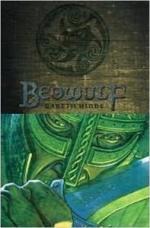|
This section contains 316 words (approx. 2 pages at 300 words per page) |
Good vs. Evil in Beowulf
Beowulf is the epic hero of this poem. He embodies all the characteristics that a hero should, such as bravery, loyalty and strength, both physical and mental. He is the archetypal hero. And not only does he fight for good, but he represents it as well.
For Beowulf to signify good there must be a contrasting evil to complete the balance. The monster Grendel and his mother are that evil. The mere look of them leaves you with an impression of fear and sin. "He strode quickly across the inlaid floor, snarling and fierce: His eyes gleamed in darkness, burned with a gruesome Light." (P. 1, L. 15-18) Their wickedness seems to spread to their home, infecting the lake in which they live. "A deer, hunted through the woods by packs of hounds, a stag with great horns, though driven through the forest from faraway places, prefers to die on those shores, refuses to save its life in that water." (P.1, L. 63-68)
As is the case with most heroes, Beowulf confronts the monsters and defeats them. With each of the characters representing good and evil respectively, Grendel's defeat clearly symbolizes Beowulf and his goodness overcoming the beasts' wickedness, just as we would view Christ defeating Satan.
Throughout history and in endless fairytales, good can always be seen coming out victorious over evil. The white knight always defeats the dragon. This is no exception with Beowulf. And though the poem ends in his demise, Beowulf will be remembered for being his peoples' savior from the evils of their world.
|
This section contains 316 words (approx. 2 pages at 300 words per page) |


